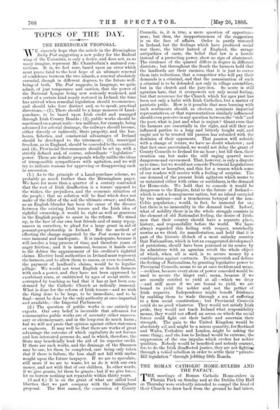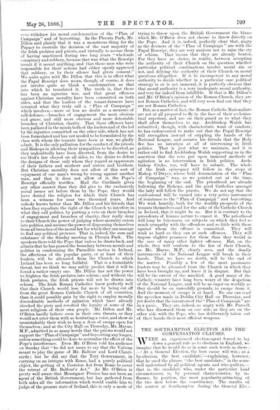THE ROMAN CATHOLIC HOME-RULERS AND THE PAPACY.
TIRE meetings of Roman Catholic Home-rulers in Phcenix Park on Sunday and at the Dublin City AO I on Thursday were evidently intended to compel the head of their Church to draw back from the ground he had taken, —to withdraw his moral condemnation of the " Plan of Campaign" and of boycotting. In the Phcenix Park, Mr. Dillon said plainly that it was a monstrous thing for the Papacy to overrule the decision of the vast majority of the Irish prelates and priests, and virtually to accuse them of having sanctioned during two long years " wholesale conspiracy and robbery, because that was what the Rescript meant if it meant anything, and that those men who were responsible for their actions had either openly approved that robbery, or by their silence had given consent." We quite agree with Mr. Dillon that this is in effect what the Papal Rescript does mean, though, of course, it does not involve quite so blank a condemnation as that into which he translated it. The truth is, that there has been an agrarian war, and that great offences against Christian morality have been committed on both sides, and that the leaders of the tenant-farmers have invented what they truly call a " Plan of Campaign " which involves,—more or less no doubt as a measure of self-defence,—breaches of engagement the most obvious and grave, and still more obvious and more detestable breaches of Christian charity. That these offences have been palliated in the minds both of the leaders and of the led by the injustice committed on the other side, which has not been formulated and has not needed to be formulated by the class with whom the tenants have been at war, we gladly admit. It is the only palliation for the conduct of the priests and Bishops in allowing their sympathies to be diverted, as they undoubtedly have been diverted, from the desire to see God's law obeyed on all sides, to the desire to defeat the designs of those only whom they regard as oppressors of their fathers and mothers and sisters and brothers. But Christian morality does not allow of this sort of repayment of one man's wrong by wrong against another man, and that it does not allow of it, the Pope's Rescript officially testifies. Had the Cardinals given any other answer than they did give to the exclusively moral issues set before them by the Pope, they would have denied the religion for which their Church has been a witness for near two thousand years. And nobody knows better than Mr. Dillon and his friends that when they repudiate the right of the Church to interfere in what they call politics, by putting a veto on their breaches of engagement and breaches of charity, they really deny to their Church the power of judging where morality enters into politics, and assume the power of dispensing themselves from all breaches of the moral law for which they can manage to find any political pretence. That is, indeed, the sum and substance of the Sunday meeting in Phcenix Park. The speakers there told the Pope that unless he draws back, and admits that he has passed the boundary between morals and politics in condemning the Parnellite tactics in Ireland, the affections of the popular party, or at least of their leaders, will be alienated from the Church to which Ireland has been so long faithful. That is a formidable threat, but we think we may safely predict that it will be found a rather empty one. Mr. Dillon has not the power to frighten the Irish prelates into schism ; and without the Irish prelates, the Irish priests will not be drawn into schism. The Irish Roman Catholics know perfectly well that their Church would lose far more by being cut off from the great Roman Catholic Church of all countries, than it could possibly gain by the right to employ morally discreditable methods of agitation which have already shocked the piety and revolted the loyalty of some of the most religious of their own people. Mr. Dillon and Mr. O'Brien hardly believe even in their own threats, or they would not utter them with so hesitating a voice, and show so unmistakably their wish to keep a door of escape open for themselves ; and at the City Hall on Thursday, Mr. Mayne, M.P., admitted in so many words that the priests would not support the "Plan of Campaign" and boycotting any longer, unless something could be done to neutralise the effect of the Pope's interference. Even Mr. O'Brien told his audience on Sunday that " he did not mean to say that the Vatican meant to play the game of Mr. Balfour and Lord Clanri- carde ; but he did say that the Tory Government, in carrying on an intrigue with Rome, had a purely political object, the getting of a Coercion Act from Rome to cover the retreat of Mr. Balfour's Act." As Mr. O'Brien is pretty well aware that Monsignor Persico has not been an agent of the British Government, but has gathered from both sides all the information which would enable him to judge of the present state of Ireland, this is only a mode of trying to throw upon the British Government the blame which Mr. O'Brien does not choose to throw directly on the Pope. And it is, indeed, perfectly clear that, angry as the devisers of the " Plan of Campaign " are with the Papal Rescript, they are very anxious not to raise the cry of schism. That means that they are already beaten. For they have no choice, in reality, between accepting the authority of their - Church on the question whether particular political combinations involve moral sin or not, and defying the authority of their Church on moral questions altogether. If it be incompetent to any moral authority to decide whether in a particular case political. strategy is or is not immoral, it is perfectly obvious that that moral authority is a very inadequate moral authority,. and very far indeed from infallible. If that is Mr. Dillon's and Mr. O'Brien's opinion of the Roman Church, they are- not Roman Catholics, and will very soon find out that they. are not Roman Catholics.
But, as a matter of fact, the Roman Catholic Nationalists, are not at all prepared to fly in the face of their ecclesias- tical superiors, and are on their guard as to what they shall allow themselves to say. Archbishop Walsh has submitted ; though, with characteristic want of candour, he has endeavoured to make out that the Papal Rescript will strengthen instead of crippling the hands of the National League, and assures his friends that the Holy- See has no intention at all of intervening in Irish politics. That is just what we maintain, and it is rather odd to find Archbishop Walsh supporting us in the assertion that the veto put upon immoral methods of agitation is no intervention in Irish politics. Arch- bishop Croke, too, will have to submit. The whole of the Irish episcopacy will follow in the steps of Bishop O'Dwyer, whose bold denunciation of the " Plan. of Campaign " was, as we pointed out at the time, the beginning of the end. The priesthood are already following the Bishops, and the good Catholics amongst the laity will follow the priests. We do not say that the confessional will be turned into a very active instrument of resistance to the " Plan of Campaign " and boycotting_ We wish heartily, both for the worldly prospects of the tenants themselves and for the sake of the Catholic Church in Ireland, that it might be so. But it is contrary to the precedents of human nature to expect it. The priesthood will long be lukewarm on subjects on which they feel so, much sympathy with the offenders and so little with those- against whom the offence is committed. They will wink as hard as they can at such offences. They will impose slighter penances for them than they would in: the case of many other lighter offences. But, on the.
whole, they will conform to the law of their Church,. as Mr. Mayne, M.P., clearly sees, and the deadly instruments of the National League will break in their hands. That, we have no doubt, will be the end of the matter. Possibly a few of the most passionate. leaders may be alienated from the Church in which they have been brought up, and leave it in disgust. But that will be the extent of the mischief. A good many of the Catholic tenantry have long been weary of the despotism. of the National League, and will be as eager on worldly ap. they should be on unworldly grounds, to escape from it.. And the moment of escape is at hand. No one can read_ the speeches made in Dublin City Hall on Thursday, and yet doubt that the inventors of the " Plan of Campaign " are in a panic. They are, indeed, as angry with Mr. Parnell. who has disowned them on one side, as they are on the other side with the Pope, who has deliberately taken out of their hands their most efficient weapons.



































 Previous page
Previous page